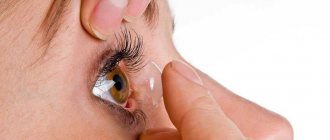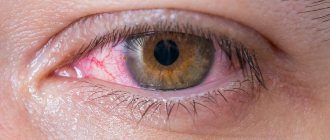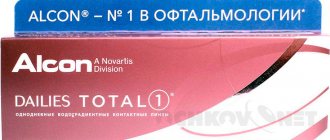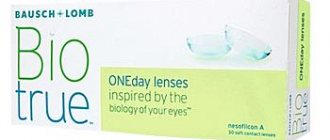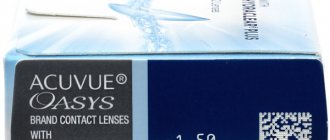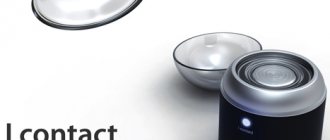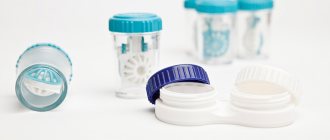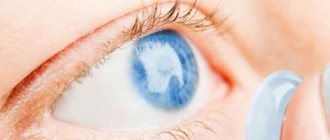Irritation from contact lenses
It must be admitted, of course, that redness of the eyes is not uncommon for those who wear contact lenses. But this cannot be called an allergy in the usual sense of the word. Rather, it is a reaction to a foreign body that goes away on its own. Lenses themselves, if they are made of high-quality materials, cannot be a source of allergies. It is more likely that lens care solution can cause such reactions than the lenses themselves.
Allergies that manifest as red eyes can have many different causes. People who are generally predisposed to allergic reactions to natural phenomena may have red eyes due to pollen or, for example, poplar fluff. And other seasonal phenomena can be the causes of such an illness, then redness will appear seasonally along with the cause of irritation. In this case, you should definitely visit not only an ophthalmologist, but also an allergy specialist, who will help identify the cause of the allergic reaction and prescribe appropriate treatment. However, there is no need to put off going to the ophthalmologist; perhaps behind the innocent redness of the eyes there is some more serious disease and you need urgent and thorough treatment to protect yourself from complications.
Allergies associated with wearing lenses
Sometimes an allergic eye reaction occurs due to intolerance by the contact lens user to certain components of the multifunctional solution (MFR), which is used as a lens care product. In this case, he should either switch to another MFR that does not contain an allergenic component; or start using a peroxide system as a care product, which does not contain any preservatives; or completely stop using any care products and switch to wearing daily lenses.
It happens that some lens users are intolerant to the silicone component of silicone hydrogel contact lenses.
In this case, it would be reasonable to switch to wearing modern hydrogel contact lenses with biocompatible properties. A more difficult situation is faced by those who develop giant papillary conjunctivitis, which is often a toxic-allergic reaction to wearing soft or hard contact lenses. According to researchers, two mechanisms are responsible for the development of giant papillary conjunctivitis: immune and mechanical. Thus, factors such as the use of lenses with a high elastic modulus can lead to the occurrence of this pathology; improper fitting of the lenses and, as a result, injury to the conjunctiva and cornea by the edges of the lenses; the presence of protein and lipid deposits on the surface of the lenses; non-compliance with the rules of care for contact lenses, and many others. The decision on the possibility of further use of contact lenses for giant papillary conjunctivitis can only be made by an ophthalmologist. So, we have seen that allergies are often not a contraindication to wearing contact lenses, of course, provided that proper measures are taken to combat it. We hope that the tips given in this article will help almost all lens wearers successfully wear them at any time of the year.
Other related articles:
Selection of contact lenses
Which contact lenses are best?
Allergy to contact lenses: what to do?
Redness can catch you at the most inopportune moment, when you do not have the opportunity to visit an ophthalmologist. In this case, you need to know a few emergency procedures that will ease your suffering until you can see a doctor.
First, you must always have special eye drops on hand that can cleanse the lacrimal gland of dust or allergen. These can be not only drops, but also special preparations containing artificial tears, which resemble our ordinary tears in their composition and are very close to them. These products should be instilled into the eyes as often as possible.
Why I love my robot vacuum cleaner so much: sharing my own experience
Secondly, you need to wash your face as often as possible, which will also help quickly remove the source of the allergy from the eyes. Of course, just washing your face will not save you from allergies, but it will greatly help relieve irritation, along with eye drops.
Thirdly, you need to change the solution to a better one, and also perform mechanical cleaning of contact lenses as often as possible. Today there are special solutions that can not only store lenses, but also simultaneously clean them while you are not wearing them.
And finally, fourthly, do not forget about sunglasses, which also provide additional protection from dust and allergens.
How to avoid all this?
Many lens wearers disdain eye drops. And in vain, because these drops not only restore the natural acid-base balance, but are also an effective lubricant. Moreover, they reduce the risk of infections, and they can be used not only when wearing “contacts”.
As for the lenses themselves, they should be soft, with a uniform surface. Modern silicone hydrogel models (they are also called “breathable”) allow oxygen to pass through, so they can be worn without taking them off for a long time. According to ophthalmologists, the use of such lenses minimizes the risk of developing infectious diseases. Do not rinse containers with tap water - use only boiled water, and try to do this after each cleaning.
It is recommended to rinse the container after each cleaning
Contact lens solution
to confirm that the cause of an allergy to contact lenses is the solution for storing them. Just change the solution and watch how your eyes react. A decrease in irritation clearly indicates that you are using a solution that is not suitable for you or is of poor quality. The cause of the allergy in this case may be a reaction to some component (preservative or active substance) of the solution. Because of this, it is worth trying other solutions. However, there are nuances here. For example, if before irritation you did not have any complaints about the solution or the behavior of your eyes, most likely the reason is not in the solution. If you have already decided to try a different solution for storing lenses, then you don’t need to try everything. You need to stop at 2-3 solutions, since such experiments may not end very well. After changing the solution, you need to monitor the reaction of the eyes - if the irritation persists, then most likely the problem is not in the solution at all.
Treatment methods
When the first unpleasant signs appear, the following measures must be taken to help alleviate the condition of allergy sufferers:
- remove contact lenses to completely eliminate contact with the provoking factor;
- rinse your eyes with warm, clean water, which will help completely eliminate the allergen;
- to cleanse the eye of an irritating allergen, preparations with artificial tears are recommended;
- apply moisturizing drops (Vizin, Refresh), which will relieve irritation of the mucous membrane.
If discomfort persists after the manipulations, you should contact an ophthalmologist and allergist.
Self-medication for allergy sufferers is contraindicated, since incorrectly selected methods to eliminate the problem can lead to a worsening of the situation, harming the health of the eye.
Drug treatment
If an allergy to contact lenses is diagnosed, the symptoms of which do not disappear on their own, the doctor prescribes drug therapy. It is symptomatic and includes:
- Antihistamines (Erius, Zyrtec or Claritin) help stop the action of the allergic component. These remedies eliminate pronounced signs of the problem without depressing the central nervous system. The medications are taken in a course, the duration of which should be from 3 days to a week.
- To eliminate swelling of the conjunctiva, itching or lacrimation, vasoconstrictor drugs (Octilia, Visin) are used. They have no medicinal effect. Used only once to relieve severe symptoms.
- Local antihistamines (Cromohexal) - help relieve redness, dryness, irritation, and also reduce itching or swelling.
Medicines prescribed to an allergy sufferer by a doctor have different frequency of use. In each clinical case, therapy is selected individually so that a reaction to medications does not occur at the same time.
Immunotherapy
Allergy is a disease that causes severe harm to the immune system. Therefore, in parallel with symptomatic treatment of the problem, doctors prescribe general tonic drugs. These include fish oil and various vitamin and mineral complexes, which are selected according to age characteristics. Immunotherapy is especially important for children and adolescents.
Traditional medicine
Along with the methods of traditional medicine, allergy sufferers resort to folk remedies to alleviate their condition. The manifestation of unpleasant symptoms can be reduced with the help of compresses made from large-leaf green tea. This product has anti-inflammatory and soothing properties. The solution for the compress should be warm so as not to burn the delicate skin of the eyelids.
Medicinal herbs (chamomile, thyme) or aloe juice help relieve inflammation. These plants soothe the affected areas and also have strong antiseptic properties. When using herbal therapy, you can apply compresses or wash your eyes with infusions up to 5-6 times a day.
Treatment with traditional medicine should be carried out only after consultation with a doctor, since the plants themselves can act as a strong allergen.
How to avoid allergies to contact lenses: expert advice
Many people do not use eye drops because they consider their use unnecessary. However, when used, the natural acid-base balance is restored, they additionally lubricate the lenses and make them more comfortable to wear. In addition, the use of such drops reduces the risk of infectious diseases. Also, such drops can be used not only while wearing lenses, because the composition of the drops is close to natural.
In addition to lenses, you also need to carefully consider the issue of lens solution, since it must have minimal allergic properties. The lenses themselves must be soft and the surface uniform. There are special “breathing” lenses that allow oxygen to pass through to the eyes and therefore do not require mandatory removal after a certain time. Today they produce “breathable” lenses that can be worn without taking them off for up to a month. According to ophthalmologists, wearing such lenses reduces the risk of developing infections.
Separately, it is worth mentioning containers for lenses, or rather, once again remind you of the rules for caring for containers for lenses. You cannot rinse the containers with ordinary running water, only boiled water, and this must be done after each use of the lenses.
Contact lenses are very convenient and comfortable. They, of course, have several disadvantages. For example, you should always have a bottle of solution and a container for lenses with you in reserve. However, despite their not very low price, the lenses are still quite affordable and very comfortable to wear. And even with allergic reactions, lenses partially relieve inflammation, rather than support it.
Author: Alexandra Aslanyan
Article protected by copyright and related rights.
When using or reprinting material, an active link to the women's website inmoment.ru is required! Beauty and eye health Return to the beginning of the section Facial care Return to the beginning of the section Beauty and Health
What eye problems occur with allergies?
In many people, allergic reactions are accompanied by conjunctivitis, an inflammation of the mucous membrane of the eye. In such a situation, there is a high risk of infection of the mucous membrane and the lens itself, so it is better to avoid wearing lenses during the treatment of conjunctivitis.
The most common problem with allergies is watery eyes. In itself, increased lacrimation is not dangerous (except that it may cause slight discomfort), but increased moisture in the cornea can cause infection.
Constantly watery eyes due to allergies are certainly inconvenient, but taking antihistamines can lead to the opposite problem - drying out of the cornea. This is dangerous for lenses because they simply won’t stay on if the cornea is too dry.
Allergies can make wearing contact lenses very difficult, but you don't have to give them up completely.
